Who Are the Boers? History, Culture & Legacy Explained
The term Boer holds a significant place in South African history. Originating from Dutch settlers, the Boers have a unique identity shaped by their journey through colonization, conflict, and cultural preservation. In this comprehensive guide, we explore who the Boers are, their origins, culture, and lasting influence in Southern Africa. Whether you're a history enthusiast or simply curious, this article will give you in-depth insight into the Boer story.
Understanding the Boer Identity
What Does the Word "Boer" Mean?
The word “Boer” comes from the Dutch word for "farmer." In the historical context of South Africa, it refers to Dutch-speaking settlers, primarily of Dutch, German, and French Huguenot descent, who arrived in the 17th and 18th centuries. These settlers later developed their own language—Afrikaans—and a distinct identity, becoming known as the Boers or Afrikaners.
The Origins of the Boers
Dutch Colonization and Early Settlements
The Boer legacy began in 1652 when the Dutch East India Company established a supply station at Cape of Good Hope under Jan van Riebeeck. This marked the beginning of European colonization in Southern Africa. Over time, settlers began farming the land, intermarrying, and forming the early Boer communities.
Voortrekkers and the Great Trek
In the 1830s and 1840s, dissatisfied with British rule, many Boers left the Cape Colony in what is known as the Great Trek. These migrating groups, known as Voortrekkers, moved north and northeast, establishing independent Boer republics like the Transvaal and the Orange Free State.
Boer Culture and Way of Life
Agricultural Lifestyle
Traditionally, the Boers were deeply connected to the land. They practiced subsistence farming and livestock herding, living in isolated homesteads. Their rural lifestyle helped preserve their language, values, and traditions.
Religion and Family Values
The Boers are predominantly Calvinist, adhering to conservative Protestant values. Family was and remains central to Boer life, with a strong emphasis on discipline, hard work, and self-reliance.
Language and Identity
The Boers developed Afrikaans—a language derived from Dutch but infused with local and foreign linguistic influences. Afrikaans became a symbol of Boer identity and played a significant role in maintaining their cultural unity.
The Boer Wars: Conflict and Resilience
First Boer War (1880–1881)
The First Boer War was fought between the British Empire and the Boer settlers of the Transvaal Republic. The Boers, using guerrilla warfare, secured a surprising victory and retained independence.
Second Boer War (1899–1902)
This war was more devastating. It resulted in the fall of both the Transvaal and the Orange Free State to the British. Over 20,000 Boer civilians died in British concentration camps, making this conflict one of the most tragic chapters in South African history.
The Aftermath and Integration
Though the Boers were defeated, their spirit endured. In 1910, the Union of South Africa was formed, merging British and Boer territories. Afrikaners gradually became a dominant political force, culminating in the implementation of apartheid in 1948—a policy largely shaped by the Afrikaner-led National Party.
Boers Today: Modern Legacy and Identity
Afrikaner Influence in South Africa
Today, many Boers identify as Afrikaners, who make up about 5-6% of South Africa’s population. Despite political and social changes, the Afrikaner community continues to preserve elements of Boer heritage through language, religion, farming traditions, and cultural institutions.
Post-Apartheid Challenges
Since the end of apartheid in 1994, Afrikaners—including descendants of Boers—have faced economic and political shifts. Issues like land reform, cultural preservation, and minority rights remain hotly debated topics in contemporary South Africa.
Boer Cultural Events and Preservation
Several festivals and organizations work to keep Boer culture alive. Examples include the annual Voortrekker Monument events and Afrikaner cultural associations like Solidarity and AfriForum.
Actionable Tips: How to Learn More About the Boers
- Visit Historical Sites: The Voortrekker Monument in Pretoria offers deep insights into Boer history.
- Read Boer War Accounts: Books and memoirs offer firsthand perspectives, such as "The Boer War" by Thomas Pakenham.
- Learn Afrikaans: Understanding the language provides direct access to Boer culture and literature.
- Explore Boer Genealogy: Use platforms like Geni or FamilySearch to trace Boer ancestry if you have South African roots.
- Watch Documentaries: Resources like BBC or History Channel have rich content on the Boer Wars and Afrikaner nationalism.
FAQs About Boers
Who were the Boers in South African history?
Boers were Dutch-speaking settlers in South Africa, mainly of Dutch, German, and French descent. They established independent republics and played a significant role in the region’s colonial and post-colonial history.
What was the Great Trek?
The Great Trek was a migration of Boer settlers in the 1830s–1840s away from British-controlled Cape Colony. It led to the establishment of the Transvaal and Orange Free State republics.
Are Boers and Afrikaners the same?
While all Boers are Afrikaners, not all Afrikaners are considered Boers. "Boer" typically refers to early Dutch settlers and their descendants with a rural farming background, whereas "Afrikaner" is a broader term encompassing the entire Afrikaans-speaking white community in South Africa.
What language did the Boers speak?
The Boers spoke Afrikaans, a language derived from 17th-century Dutch, enriched by German, Malay, Portuguese, and African languages.
What is the legacy of the Boer War?
The Boer War deeply affected South African society, leading to British dominance but also shaping Afrikaner nationalism and resistance, influencing 20th-century politics and the rise of apartheid.
Conclusion
The story of the Boer people is complex, filled with triumph, tragedy, and resilience. From early colonists to modern Afrikaners, their journey through conflict and cultural evolution has left a permanent imprint on South African history. Whether you’re diving into history, genealogy, or cultural studies, understanding the Boers provides valuable context to the region’s past and present.
Want to explore more fascinating histories? Subscribe to our newsletter for deep dives into unique cultures and historical events!











0 Comments